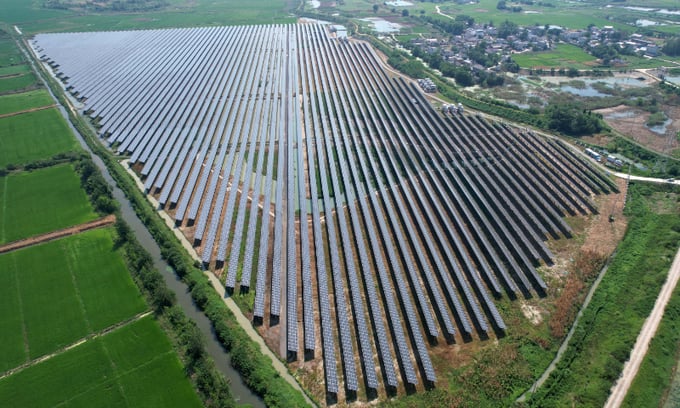May 31, 2025 | 12:16 GMT +7
May 31, 2025 | 12:16 GMT +7
Hotline: 0913.378.918
May 31, 2025 | 12:16 GMT +7
Hotline: 0913.378.918

Photo taken on August 9, 2024 shows an agricultural complementary photovoltaic (PV) power station in Guosheng village, East China's Anhui Province. In recent years, Guosheng has been adhering to green development, combining PV power stations with agriculture, allowing clean electricity generation and farming to take place simultaneously. Photo: VCG.
China on Sunday unveiled a groundbreaking guideline for accelerating a comprehensive green transition in all economic and social sectors, the central government's first systematic deployment of its green and low-carbon goals, the Xinhua News Agency reported.
Experts said that the extensive guideline will further cement China's leading role in the green transition, as well as indicate an unwavering determination to fulfill the nation's carbon reduction commitment.
The 33-point guideline released by the Central Committee of the Communist Party of China and the State Council, the country's cabinet, outlined key targets for 2030 related to the country's broad green transition.
By 2030, key areas in the economic and social sectors will see notable progress in the green transition. By 2035, a green, low-carbon and circular economy will largely be established, with carbon emissions peaking and then gradually declining, while economic and social development will fully adopt a green path, according to the guideline.
The guideline projects that the scale of the energy-saving and environmental protection industry will reach about 15 trillion yuan ($2 trillion) by actively promoting the rapid development of green and low-carbon industries and business models.
By 2030, the target is for non-fossil fuels (wind, solar, hydropower, offshore wind and coastal nuclear power) to constitute 25 percent of the total energy mix. To achieve this target, the guideline emphasizes the need for the accelerated development of these energy sources, tailored to local conditions.
These objectives also align with the Chinese central government's recent resolution to advance a green, low-carbon and circular economy through comprehensive policy support, including fiscal, tax, financial, investment and pricing measures.
China is among the countries experiencing the fastest growth in renewable energy, thanks to its extensive efforts in installing wind turbines, hydropower systems and solar panels, and the expansion of new-energy vehicles, Ma Jun, director of the Beijing-based Institute of Public and Environmental Affairs, told the Global Times on Sunday.
However, Ma noted that China's energy structure remains heavily reliant on coal and faces both internal and external challenges. "At this critical juncture, the new guidelines with clear measures are crucial for the nation to achieve its carbon emissions targets," he emphasized.
The guideline also said that the annual use of major solid waste is projected at about 4.5 billion tons, achieved through measures such as advancing the resource recycling and remanufacturing industries to improve resource utilization.
Hu Qimu, deputy secretary-general of the Digital-Real Economies Integration Forum 50, noted that the carbon costs for China's manufacturing sector will significantly raise the export costs for Chinese enterprises due to their carbon footprints.
Hu said that the guideline is crucial for both the nation's green transition and supporting China's real economy, which is struggling to reduce carbon emissions.
"The guideline specified necessary actions for high-emission industries and aligns with China's goals to peak carbon dioxide emissions by 2030 and achieve carbon neutrality by 2060," Hu added.
The document also highlighted three key actions -- adopting a comprehensive conservation strategy, encouraging green consumption and using technological innovation. These measures aim to create a resource-efficient and eco-friendly spatial layout and industrial structure, production methods and lifestyle.
Experts said that this strategic plan reflects China's ongoing efforts to balance economic development with ecological sustainability, demonstrating its commitment in global environmental initiatives.
(Global Times)

(VAN) Vikas Rambal has quietly built a $5 billion business empire in manufacturing, property and solar, and catapulted onto the Rich List.

(VAN) Available cropland now at less than five percent, according to latest geospatial assessment from FAO and UNOSAT.

(VAN) Alt Carbon has raised $12 million in a seed round as it plans to scale its carbon dioxide removal work in the South Asian nation.

(VAN) Attempts to bring down the price of the Japanese staple have had little effect amid a cost-of-living crisis.

(VAN) Fourth most important food crop in peril as Latin America and Caribbean suffer from slow-onset climate disaster.

(VAN) Shifting market dynamics and the noise around new legislation has propelled Trouw Nutrition’s research around early life nutrition in poultry. Today, it continues to be a key area of research.

(VAN) India is concerned about its food security and the livelihoods of its farmers if more US food imports are allowed.